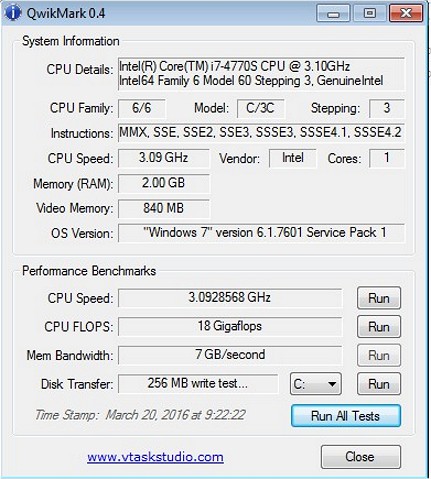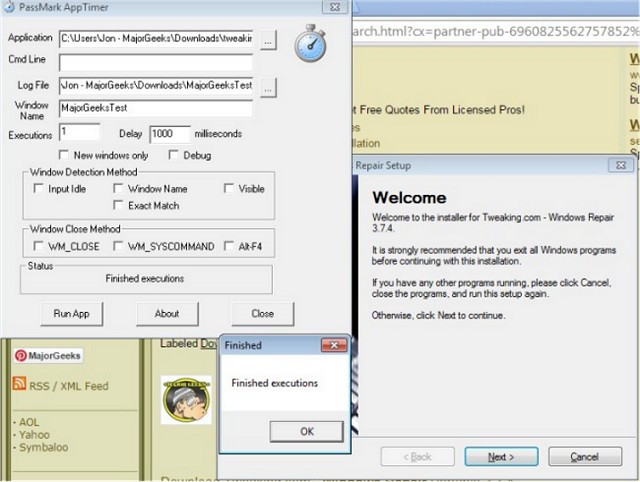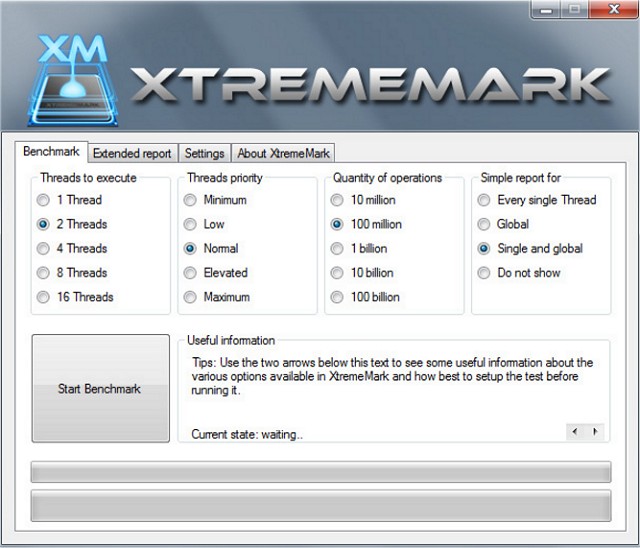Test Your Machine With These 3 Free PC Benchmarking Tools
Posted by: Jon Ben-Mayor on 04/03/2016 05:37 AM
[
 Comments
]
Comments
]
We all want our machines to operate and perform at the highest level possible and there are many programs that will adequately test what your machine is capable of doing while under load. The following new to MajorGeeks apps do just that, providing you with app run times, CPU speed and more.
QwikMark is a lightweight benchmark tool that will perform a fast check all within a single screen.

It is simple to use and offers you the option to run each test individually or all at once depending on what you require and the fact that it is a single uncomplicated screen makes it a viable option for running quick performance testing. As a side note, this tool was used to test hardware commands for vTask Studio.
QwikMark will display the CPU details/family/model, CPU stepping, instructions, CPU speed/vendor/cores, RAM memory, video memory, and OS version. You also have the option to run performance benchmarks on CPU speed/flops, mem bandwidth, and disk transfer rates.
Passmark AppTimer is an extremely lightweight benchmarking tool designed for calculating the time an application requires to launch.

It runs an executable a number of times and time how long it takes for the application to reach a state where user input is being accepted before exiting the application. After each run of the application, Passmark AppTimer will then attempt to close it in an automated fashion while logging the startup time measurements to a log file.
This can be useful when comparing the performance of different products on the same hardware, or comparing the performance of the same product on different hardware.
XtremeMark will test the speed of your PC, and in particular, your CPU (Central Processing Unit) by executing a large number of parallel calculations.

The latest XtremeMark can put both older and newer CPUs to the test; it supports 32/64bit processors, multicore and multithread (max 16 cores or parallel threads) machines. The strong point of XtremeMark is in its wide range of customization options: you can set how many threads to use for the test, how many calculations to carry out (from 10 million to 100 billion) and the priority level for calculations. Once a test has been performed, XtremeMark compiles a brief report which contains precise info about the computer and test results (the results are also exportable as TXT or RTF format files, thus it'll be easier to save them or share them on the Net, in forums, websites, via mail or even in a chatroom).
QwikMark is a lightweight benchmark tool that will perform a fast check all within a single screen.

It is simple to use and offers you the option to run each test individually or all at once depending on what you require and the fact that it is a single uncomplicated screen makes it a viable option for running quick performance testing. As a side note, this tool was used to test hardware commands for vTask Studio.
QwikMark will display the CPU details/family/model, CPU stepping, instructions, CPU speed/vendor/cores, RAM memory, video memory, and OS version. You also have the option to run performance benchmarks on CPU speed/flops, mem bandwidth, and disk transfer rates.
Passmark AppTimer is an extremely lightweight benchmarking tool designed for calculating the time an application requires to launch.

It runs an executable a number of times and time how long it takes for the application to reach a state where user input is being accepted before exiting the application. After each run of the application, Passmark AppTimer will then attempt to close it in an automated fashion while logging the startup time measurements to a log file.
This can be useful when comparing the performance of different products on the same hardware, or comparing the performance of the same product on different hardware.
XtremeMark will test the speed of your PC, and in particular, your CPU (Central Processing Unit) by executing a large number of parallel calculations.

The latest XtremeMark can put both older and newer CPUs to the test; it supports 32/64bit processors, multicore and multithread (max 16 cores or parallel threads) machines. The strong point of XtremeMark is in its wide range of customization options: you can set how many threads to use for the test, how many calculations to carry out (from 10 million to 100 billion) and the priority level for calculations. Once a test has been performed, XtremeMark compiles a brief report which contains precise info about the computer and test results (the results are also exportable as TXT or RTF format files, thus it'll be easier to save them or share them on the Net, in forums, websites, via mail or even in a chatroom).
Comments





